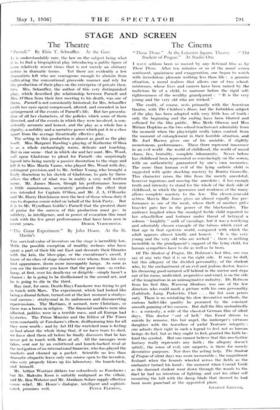Tut: survival-value of inventors on the stage is incredibly low.
With the possible exception of wealthy recluses who have spent a part of their life out-East and decorate their libraries with the Iris, the blow-pipe, or the executioner's sword, I know of no class of stage character over whom, from his very first appearance, doom more inescapably hangs. As soon as you see the inventor you know that the poor man—so cocks- hoop, at first, over his death-ray or dirigible--simply hasn't a chance ; he is going to be disillusioned in the second act, and he is going to die in the third. • Ray (not, for once, Death-Ray) Fanshawe was trying to get in touch with Mars. The experiment, which had looked like being a dismal failure, turned out at the last moment a strabys- inal success strabysmal in its unforeseen and disconcerting repercussions. The Martians, it seemed, were Christians, so there was a boom_ in religion. The financial markets were also affected, politics were in a terrible mess, and all Europe had hysterics. The Prime Minister and the Editor of The Times were constantly at Fanshawe's elbow, disillusioning him for all they were worth ; and by Act III the wretched man is feeling so bad about the whole thing that, if we have tears to shed, we have shed them all before he finally discovers that he has never got in touch with Mars at all. All the messages were fakes, sent out by an embittered and hunch-backed rival at the instigation of an international financier, who has played the markets and cleaned up a packet. Scientific no less than dramatic etiquette leave only one course open to the inventor, who very properly blows up his laboratory, the hunch-back, and himself. • . Mr. Arthur Wontner dithers too colourlessly as Fanshawe ; but Mr. Malcolm Keen is suitably malignant as the villain, and Mr. Ben Webster and Mr. Abraham Sofaer supply effective comic relief, Mr. ‘Floare's dialogue, intelligent and sophisti-














































 Previous page
Previous page